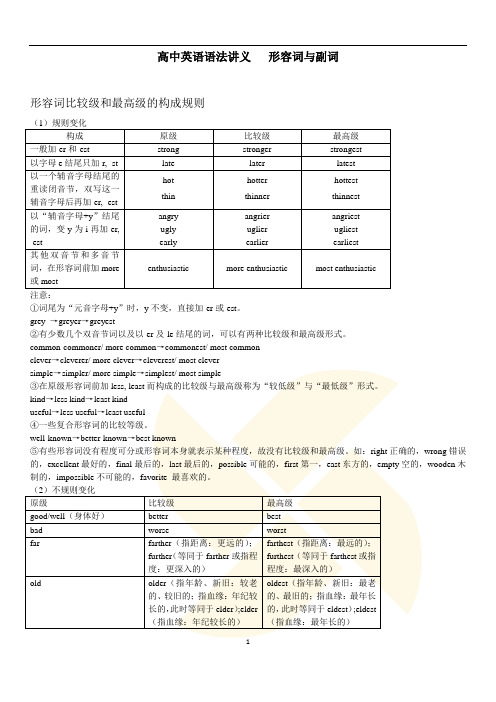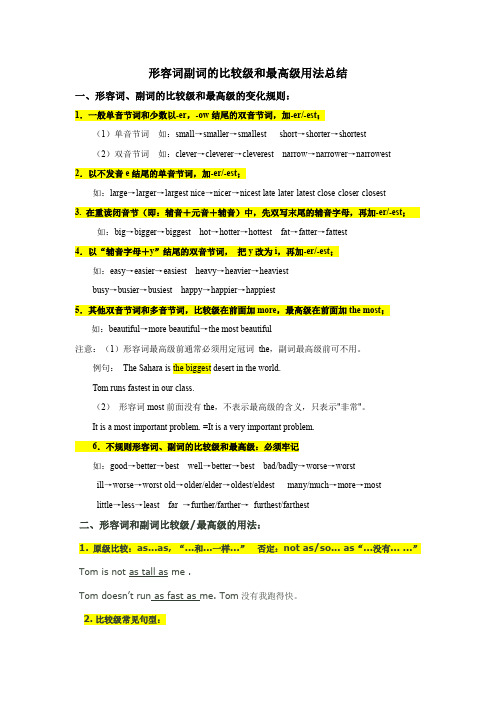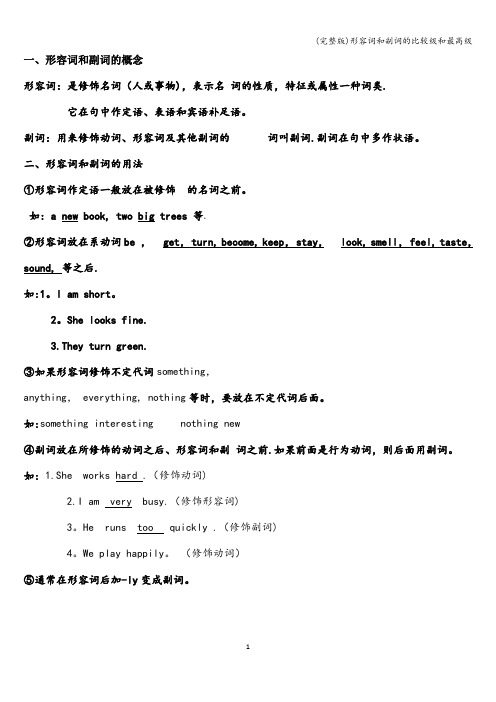形容词与副词的比较级和最高级第14讲讲义
高中英语语法讲义——形容词与副词

高中英语语法讲义形容词与副词形容词比较级和最高级的构成规则构成原级比较级最高级一般加-er和-est strong stronger strongest 以字母e结尾只加-r, -st late later latest以一个辅音字母结尾的重读闭音节,双写这一辅音字母后再加-er, -est hotthinhotterthinnerhottestthinnest以“辅音字母+y”结尾的词,变y为i再加-er, -est angryuglyearlyangrieruglierearlierangriestugliestearliest其他双音节和多音节词,在形容词前加more或mostenthusiastic more enthusiastic most enthusiastic①词尾为“元音字母+y”时,y不变,直接加-er或-est。
grey →greyer→greyest②有少数几个双音节词以及以-er及-le结尾的词,可以有两种比较级和最高级形式。
common-commoner/ more common→commonest/ most commonclever→cleverer/ more clever→cleverest/ most cleversimple→simpler/ more simple→simplest/ most simple③在原级形容词前加less, least而构成的比较级与最高级称为“较低级”与“最低级”形式。
kind→less kind→least kinduseful→less useful→least useful④一些复合形容词的比较等级。
well-known→better-known→best known⑤有些形容词没有程度可分或形容词本身就表示某种程度,故没有比较级和最高级。
如:right正确的,wrong错误的,excellent最好的,final最后的,last最后的,possible可能的,first第一,east东方的,empty空的,wooden木制的,impossible不可能的,favorite 最喜欢的。
形容词副词的比较级和最高级的变化规则及用法(完美版)

形容词副词的比较级和最高级用法总结一、形容词、副词的比较级和最高级的变化规则:1.一般单音节词和少数以-er,-ow结尾的双音节词,加-er/-est;(1)单音节词如:small→smaller→smallest short→shorter→shortest(2)双音节词如:clever→cleverer→cleverest narrow→narrower→narrowest2.以不发音e结尾的单音节词,加-er/-est;如:large→larger→largest nice→nicer→nicest late-later-latest close-closer-closest3. 在重读闭音节(即:辅音+元音+辅音)中,先双写末尾的辅音字母,再加-er/-est;如:big→bigger→biggest hot→hotter→hottest fat→fatter→fattest4.以“辅音字母+y”结尾的双音节词,把y改为i,再加-er/-est;如:easy→easier→easiest heavy→heavier→heaviestbusy→busier→busiest happy→happier→happiest5.其他双音节词和多音节词,比较级在前面加more,最高级在前面加the most;如:beautiful→more beautiful→the most beautiful注意:(1)形容词最高级前通常必须用定冠词the,副词最高级前可不用。
例句:The Sahara is the biggest desert in the world.Tom runs fastest in our class.(2)形容词most前面没有the,不表示最高级的含义,只表示"非常"。
It is a most important problem. =It is a very important problem.6.不规则形容词、副词的比较级和最高级:必须牢记如:good→better→best well→better→best bad/badly→worse→worstill→worse→worst old→older/elder→oldest/eldest many/much→more→mostlittle→less→least far →further/farther→furthest/farthest二、形容词和副词比较级/最高级的用法:1. 原级比较:as...as, “...和...一样...”否定:not as/so... as“...没有... ...”Tom is not as tall as me .Tom doesn’t run as fast as me. Tom没有我跑得快。
八年级形容词、副词的比较级和最高级语法知识讲解

八年级形容词、副词的比较级和最高级语法知识讲解八年级上册英语形容词和副词的比较级和最高级绝大多数形容词有三种形式,原级,比较级和最高级, 以表示形容词说明的性质在程度上的不同。
一、形容词的原级: 形容词的原级形式就是词典中出现的形容词的原形。
例如: poor tall great glad bad二、比较级的定义:大多数的形容词都有三个级别:原级、比较级、最高级。
其中比较级表示“更……”,用于两者之间的比较,用来说明“前者比后者更……”,比较级前面一般用much, even, a little,a lot修饰,其中even, much 只能修饰比较级。
三、比较级和最高级的构成:(1)规则变化:单音节和部分双音节的形容词比较级一般在词尾加-er,最高级在词尾加-est calm--calmer—calmest tall--taller--tallest smart--smarter--smartest以字母e结尾的比较级直接在词尾加-r,最高级加-st.nice--nicer -nicest fine--finer-finest large—larger--largest以“辅音+y 结尾的词,变y为 i,比较级加-er”,最高级加-est.early—earlier-earliest happy—happier-happiest busy—busier-busiest 以重读闭音节的单个辅音字母结尾的词,双写辅音字母,比较级加-er,最高级加-estbig—bigger-biggest thin—thinner-thinnest hot—hotter-hottest多音节或部分双音节的形容词,比较级在原级前面加more,最高级在原级前加moste.g: popular--more popular—most popularimportant--more important—most important (2)不规则变化:少数形容词的比较级变化是不规则的:good—better--best bad/ill—worse--worst many/much—more--mostlittle—less--least far--farther/further—farthest/furthest old---older/elder—oldest/eldest四、比较级的用法:(一)当两个人或事物(A和B)进行比较时,我们需要用到形容词(副词)的原级或者比较级1( 表达“A和B一样”,用as…as的结构。
形容词、副词的比较级和最高级课件

高得多
少的多
much more much farther
多的多
远的多
最高级
表示三者及三者以上 (人/事物)的比较,用
1 the +最高级+ (in/of短语表范围)
She is the most beautiful of the three.
她是三个中最漂亮的
最高级
用one of+ the+最高级+复数名词,表示
2 “最… 之一”
Chinese is one of the most popular languages in the world.
汉语是世果上最流行的语言之一。
最高级
表示“第几最...样”用the+序数词+最高级
3 十单数名词
The Yellow River is the second longest river in China.
原级
表示两者相同程度的比较
He is as tall as me.
他和我一样高,这里的“高”就可以用原级, 因为表示两者程度一样
比较级
表示两者之间的比较,表示“较…”,“更…”
He is taller than me.
他和比我高,这里的两者之间比出区别了, “高”就可以用比较级,
最高级
表示三者及以上的人货物进行比较,表示“最…”
这个盒子比那个盒子大。
2 比较级+and+比较级,表示“越来 越。。样”
The weather is colder and colder.
天气越来越冷。
3 the +比较级+of the two,表示“两 者中比较。。。的一个”
初中八年级英语《形容词与副词的比较级和最高级》名师优质课PPT教学课件

outgoing serious important lazy quiet funny fat high difficult hard comfortable
一、形容词和副词比较级和最高级的构成
不规则变化 原级
good / well bad / badly/ill many / much
形容词与副词的 比 较 级和最高 级
学习目标
1.掌握形容词、副词的比较级和最 高级的构成
2.学会运用形容词、副词的比较级 和最高级
Show Learning aims
形容词和副词的比较级和最高级
大多数形容词和副词有三个等级: 1、原级,即原形。(没有比较时用原级) 2、比较级,表示“较……”或 “更……一些”。(两者比较时用比较
little
far
old
比较级 better worse more less farther further older elder
最高级 best west oldest eldest
二、形容词和副词的比较级和最高级的用法
1、表示“比……更……”,用“比较级+ than” 结构。She is taller than her sister.
C. better
D. gooder
4. This one is too large. Can you show me a __________one?
A. larger
B. large
D. smaller
C. small
5. —Do you think March is __________ than January?
2.Who / Which + 比较级 , A or B ? Who is taller, Mary or Tom?
形容词和副词的比较级和最高级通用课件

比较级和最高级的错误形式
总结词
常见的错误形式包括使用不正确的词尾 、省略或添加不必要的字母、以及错误 的拼写形式。
VS
详细描述
在比较级和最高级的构成中,形容词和副 词的变化规则有所不同。一般来说,大多 数形容词在比较级时在词尾加-er,在最 高级时加-est;而副词在比较级时通常在 词尾加-er,在最高级时加-est。但是, 有一些特殊的形容词和副词需要使用不同 的变化规则。此外,还有一些形容词和副 词的比较级和最高级是不规则的,需要单 独记忆。在使用比较级和最高级时,应该 遵循正确的变化规则,避免出现拼写错误 和使用不正确的形式。
例词:tall—taller—tallest; old—older—oldest; fast—
faster—fastest。
比较级和最高级的答案解析
副词比较级和最高级的规则变化
规则变化:一般在副词后加上-er或-est。
例词:slowly—more slowly—most slowly; quickly—more quickly—most quickly。
表达偏好
我们也会使用形容词的比较级和最高级来表达对事物的偏好。例如,“我更喜欢 这个蛋糕”中的“更喜欢”就是比较级。
在写作中的应用
描述人物或事物
在写作中,我们经常使用形容词的比较级和最高级来描述人 物或事物的特征。例如,“他是最聪明的学生”中的“最聪 明”就是最高级。
表达观点和立场
我们也会使用形容词的比较级和最高级来表达对某个观点或 立场的看法。例如,“这个计划是最好的选择”中的“最好 的选择”就是最高级。
规则变化
形容词规则变化
大多数形容词的比较级和最高级都遵循规则变化,即通过在词尾加-er 和 -est 构成比较级和最高级。
形容词副词的比较级和最高级ppt

表示“越来越……”。
详细描述
这种句型中,两个比较级连用,通常用于描述某种状态或趋势逐渐加强或持续发展。例 如,“The children are becoming more and more naughty.”(孩子们变得越来越
顽皮。)
否定词+比较级
总结词
表示“不比……更……”。
详细描述
这种句型中,否定词与比较级连用,通常用 于表示某事物与其他事物相比没有更优越或 更出色。例如,“I am not better than you.”(我不比你更好。)
表示某一事物与其他事物相比,程度 或数量上的差异。
形容词副词的最高级 表示某一事物在三个或三个以上的同 类事物中,程度或数量上的最高或最 低。
规则变化
规则变化的形容词副词,通常在原级的基础上,通过加后缀“-er”或“-est”构 成比较级或最高级。例如,“fast”的比较级是“faster”,最高级是 “fastest”。
注意避免使用错误的形式
在使用形容词或副词的比较级和 最高级时,需要注意避免使用错
误的形式。
Байду номын сангаас
常见的错误形式包括不规则变化 、拼写错误、语法错误等。
为了避免这些错误,需要熟练掌 握形容词和副词比较级和最高级 的规则变化和特殊情况,并注意 检查和修正自己的语言错误。
THANKS
感谢观看
该使用最高级。
注意使用场合和对象
在不同的场合和面对不同的对象时, 应该选择适当的形容词或副词的比较 级和最高级。
例如,在正式的演讲或写作中,应该 使用“the most important”,而在 口语中可以使用“really important”。
(完整版)形容词和副词的比较级和最高级

一、形容词和副词的概念形容词:是修饰名词(人或事物),表示名词的性质,特征或属性一种词类.它在句中作定语、表语和宾语补足语。
副词:用来修饰动词、形容词及其他副词的词叫副词.副词在句中多作状语。
二、形容词和副词的用法①形容词作定语一般放在被修饰的名词之前。
如: a new book, two big trees等.②形容词放在系动词be , get, turn, become, keep, stay, look, smell, feel, taste,sound, 等之后.如:1。
I am short。
2。
She looks fine.3.They turn green.③如果形容词修饰不定代词something,anything, everything, nothing等时,要放在不定代词后面。
如:something interesting nothing new④副词放在所修饰的动词之后、形容词和副词之前.如果前面是行为动词,则后面用副词。
如: 1.She works hard .(修饰动词)2.I am very busy.(修饰形容词)3。
He runs too quickly .(修饰副词)4。
We play happily。
(修饰动词)⑤通常在形容词后加-ly变成副词。
形容词副词比较级最高级变化形式归纳大多数形容词和副词有比较级和最高级的变化,即原级、比较级和最高级,用来表示事物的等级差别。
原级即形容词的原形,比较级和最高级有规则变化和不规则变化两种。
规则变化1.单音节以及少数双音节的词后面直接加-er 或—est原级比较级最高级tall taller tallestsmart smarter smartestshort shorter shortest特别提醒:以-y,-er, -ow, le结尾的双音节形容词末尾加er和est.如:healthy, funny, busy, hungry, easy, happy, early, pretty, lazy, heavy,dirty, clever, narrow等。
- 1、下载文档前请自行甄别文档内容的完整性,平台不提供额外的编辑、内容补充、找答案等附加服务。
- 2、"仅部分预览"的文档,不可在线预览部分如存在完整性等问题,可反馈申请退款(可完整预览的文档不适用该条件!)。
- 3、如文档侵犯您的权益,请联系客服反馈,我们会尽快为您处理(人工客服工作时间:9:00-18:30)。
职称英语基础班基础班第14讲课件讲义(环球职业教育在线)
职称英语基础班基础班第14讲讲义
形容词与副词的比较级和最高级
形容词与副词的比较级和最高级
阅读与欣赏
●Education is what survives.
—B. F. SKINNER, in New Scientist
教育是指最后幸存的东西。
——《科学新秀》史肯尼尔·B.F.
●Character is what you are in the dark.
—D. L. Moody, USA churchman
暗处最能反映一个人的真正品格。
——美国教士穆迪· D. L.
●Tell me what company you keep, and I’ll tell you what you are.
—MIGUEL DE CERVANTES
告诉我你有什么样的伙伴,我就能说出你是什么样的人。
Tall fat
I am tall.
I am taller than you ( are tall ).
这个女孩比那个女孩胖。
The girl is fatter than that one.
这个女孩比那个女孩漂亮。
The girl is more beautiful than that one.
这个男孩比那个男孩聪明。
The boy is more clever than that one.
不规则容形词与副词
good better
well better
many more
much more
bad worse
我学英语比他好。
I study English harder than he
形容词与副词的最高级
I am the tallest in our class.
我是我们班最高的。
I am more beautiful than she.
我比她漂亮。
I am the most beautiful in our class.
我是我们班最漂亮的。
不规则容形词与副词
good better best
well better best
many more most
much more most
bad worse worst
He is the best student in our class.
他是我们班最好的学生。
课堂练习
1:Our teacher’s book is better than their teacher’s and Teacher Sun’s book is the best.
2: The earth is bigger than the moon. The sun is bigger than the earth. Which is the biggest?
3: Do you know which is the biggest, the moon, the earth and the sun?
4: The girl of your class eats more than that one of my class.
I eat most in my class. Do you know who eats most in your school? 5:Do you know that his father is younger than his mother?
6:I think that my mother is lazier than my father.
课堂答案
1: 我们老师的那本书比他们老师的书好,孙老师的书是最好的。
2: 地球比月亮大,太阳比地球大,哪一个最大?
3:你知道哪一个是最大的?地球、月亮、还是太阳?
4: 你们班的那个女孩比我们班的那个女孩吃的多,我是我们班吃的最多的,你知道全校谁吃的最多的吗?
5:你知道他爸比他妈还年轻吗?
6:我认为我妈比我爸还懒lazy。
▲由连词that、if、whether 引导的名词性从句
I don’t know that he studies English hard.
I don’t know if he studies English hard.
I don’t know whether he studies English hard or not.
I don’t know if he will be our teacher.
I don’t know who studies English
I don’t know what you study.
I don’t know whose sister studies English
I don’t know whose sister you love.
I don’t know how much money he has.
I don’t know how many daughters he has.
完整:that
是否: If whether… or not
东西:what
谁: who
谁的:whose
那一个: which
多少: How many How much
为什么:why
怎么: how
在哪:where
什么时间:when
I am glad that……
I am sorry that……
I am sure that……
课堂练习
7: Do you know why I am more clever than the teacher of your class? 8: Which wallet is bigger, your father’s or your mother’s?
9: I think that our monitor is more foolish than before.
The film is more interesting than that one.
课堂答案
7:你知道为什么我比我们班老师还聪明吗?
8:你爸爸和你妈妈的钱包哪一个更大?
9:我认为我们班长比以前更傻。
10: 这个电影比那个电影更有意思interesting.。
